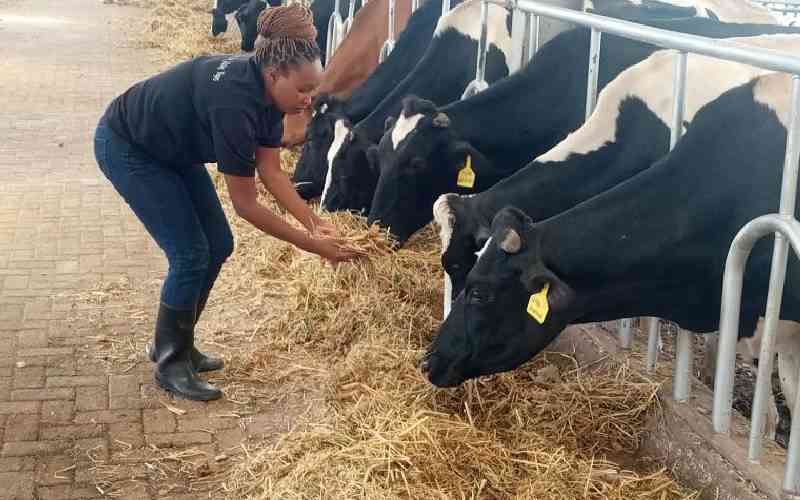The multi-billion shilling pharmaceutical sector is in jitters as two ministries tussle over powers to regulate the manufacturing, importation and sale of veterinary medicines.
The battle pits the Ministry of Health and its Agriculture and Livestock counterpart over the power to regulate veterinary medicines, which forms a sizeable part of the pharmaceutical industry in Kenya.
The tug of war emerged after the Ministry of Agriculture and Livestock gazetted new regulations establishing Veterinary Medicines Directorate, a new body to regulate the segment.
The regulations require all entities, including pharmaceutical manufacturers, importers, distributors and individual chemists to deal solely with the new directorate.
However, the Ministry of Health has resisted the move, insisting that the legal mandate over that class of medicines remains firmly under it, through the Pharmacy and Poisons Board which has be carrying out that function for many years.
“As far as I know, the law that gives the Pharmacy and Poisons Board powers over veterinary medicines still stands. It has not been repealed. So players in the pharmaceutical industry should only deal with the board,” said Health Cabinet Secretary Dr Cleopa Mailu. Efforts for smooth resolution through meetings between the Cabinet Secretaries for Health and Agriculture together with their technical teams have not borne fruit.
The battle has left the pharmaceutical industry in confusion and uncertainty that threatens to undermine a sector that contributes significantly to the country’s economy. Pharmaceutical distributors, who have a significant stake in the sector, have warned that if the matter is not resolved speedily, it will result in increased costs of doing business for the sector and higher prices of vital medicine for animals.
The Kenya Pharmaceutical Distributors Association (KPDA) said costs will rise due to double regulation of the sector since there are now two institutions in law to regulate veterinary medicines.
“The firms, which manufacture, import, distribute and dispense human medicines are the same ones that deal in veterinary medicine. Having them regulated by two different bodies only increases costs that will be passed on to final users,” said KPDA Chairman Dr Kamamia Murichu.
He added: “The double regulation will create confusion in the sector and create loopholes for proliferation of counterfeit and substandard medicines in the market.”
KPDA prefers regulation of Vet medicines to be left with the Ministry of Health saying veterinarians should concentrate on issuing prescriptions just like medical doctors and should not be involved in regulation and dispensing of veterinary medicine.
But on his part, Livestock Department Principal Secretary Andrew Tuimur insisted that there is no issue of double regulation of the pharmaceutical sector since ‘due process was followed in creating the directorate and assigning its regulatory powers over vet medicines.”
He added: “Even the Attorney General’s office issued a legal opinion in May 2015 validating the transfer of the regulatory mandate from the Ministry of Health. So we urge that the directorate be allowed to do its work.”
The PS claimed the Ministry of Health officials were part of the stakeholders invited during the development of the regulations creating the directorate.
This assertion has been dismissed as untrue by CS Mailu.
Stay informed. Subscribe to our newsletter
He said the directorate was created in response to widespread misuse of animal medicines saying many pharmacists are not well informed with regard to dispensing the drugs in right dosages.
Incorrect doses
Last week, the tussle escalated when KPDA moved to the High Court seeking Judiciary’s intervention to resolve the ongoing tussle that is based on conflicting readings of the law.
The High Court suspended implementation of the regulations gazetted by the Ministry of Agriculture and Livestock pending hearing of the matter.
The tussle adds to the challenges facing the pharmaceutical sector that is struggling against proliferation of substandard medicine in the markets, both veterinary and human.
In addition, a high number of unqualified persons posing as professionals are illegally dispensing incorrect doses of medicine resulting in health complications in animals and humans or making pathogens resistant to available medicines. —[email protected]
 The Standard Group Plc is a
multi-media organization with investments in media platforms spanning newspaper
print operations, television, radio broadcasting, digital and online services. The
Standard Group is recognized as a leading multi-media house in Kenya with a key
influence in matters of national and international interest.
The Standard Group Plc is a
multi-media organization with investments in media platforms spanning newspaper
print operations, television, radio broadcasting, digital and online services. The
Standard Group is recognized as a leading multi-media house in Kenya with a key
influence in matters of national and international interest.
 The Standard Group Plc is a
multi-media organization with investments in media platforms spanning newspaper
print operations, television, radio broadcasting, digital and online services. The
Standard Group is recognized as a leading multi-media house in Kenya with a key
influence in matters of national and international interest.
The Standard Group Plc is a
multi-media organization with investments in media platforms spanning newspaper
print operations, television, radio broadcasting, digital and online services. The
Standard Group is recognized as a leading multi-media house in Kenya with a key
influence in matters of national and international interest.









